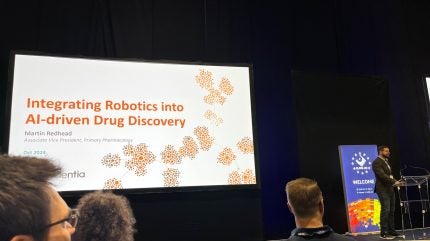
As AI continues to disrupt the healthcare industry, more pharma companies are using algorithms to design drug molecules.
AI-driven pharma tech company Exscientia detailed how robotics and AI can be used to automate its entire end-to-end drug discovery workflow, at the ELRIG Drug Discovery 2024 meeting in London, UK, on 2 to 3 October.

Discover B2B Marketing That Performs
Combine business intelligence and editorial excellence to reach engaged professionals across 36 leading media platforms.
Martin Redhead, associate vice president, Exscientia, detailed that the number of AI-designed molecules entering clinical trials has been increasing at an exponential rate since 2016, according to a publication by the Boston Consulting Group. Additionally, early data shows an 80% Phase I success rate for AI-designed molecules compared to a 15% industry average.
The Oxford-headquartered company’s automated system focuses on flexibility to run a variety of assays, rather than high-throughput screening (HTS). This allows the system to rapidly test and understand complex targets and mechanisms.
“Traditional assaying automation is focused on HTS, and that means a human will look after the stocks and take them out of freezers. A human will prepare them on the bench. A human will load up the robot, and the robot will do the same assay over and over and over at scale,” said Redhead.
He explained that automation has economically incentivised running more assays and generating increased data for AI, despite fewer experiments.

US Tariffs are shifting - will you react or anticipate?
Don’t let policy changes catch you off guard. Stay proactive with real-time data and expert analysis.
By GlobalDataExscientia recently unveiled a 26,000ft² robotic laboratory in Oxfordshire, UK. According to Redhead, the company has used AI to design four molecules in the last five years, all offering therapeutic classes with reduced human involvement.
However, Redhead emphasised that AI is not there to replace humans, but to increase productivity: “People often tell me that they are worried AI is going to take their job. What I think is exactly the opposite, it’s going to make you a lot more efficient. It is going to make you better at your job.”
Biotechs with AI-led drug pipelines appear to be attracting higher investment. In 2021, pharma giant Bristol-Myers Squibb signed a $1.2bn AI drug discovery deal with Exscientia to develop small molecules. Across healthcare, the AI market is expected to be worth $908.7bn by 2030 according to analysis by GlobalData.
GlobalData is the parent company of Pharmaceutical Technology.




